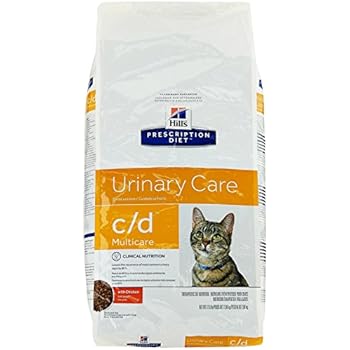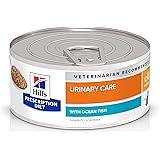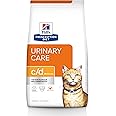Urinary health is a critical aspect of pet care, especially for cats and dogs. Conditions such as urinary crystals, stones, and infections can severely impact a pet’s quality of life. Hill’s Prescription Diet Urinary Care is designed to address these issues scientifically. This article explores the mechanisms behind this special diet, its ingredients, and its impact on maintaining urinary health in pets.
Understanding Urinary Health in Pets

Before diving into the specifics of Hill’s Prescription Diet Urinary Care, it is essential to understand the common urinary issues that affect pets:
- Urinary Tract Infections (UTIs): Bacterial infections that can cause pain and discomfort.
- Urinary Crystals: Mineral crystals that can form in the urine, leading to irritation and potential blockage.
- Bladder Stones: Hard deposits that can develop from urinary crystals, causing severe pain and obstruction.
- Feline Idiopathic Cystitis (FIC): A mysterious condition in cats leading to inflammation of the bladder without an identifiable cause.
These conditions not only cause discomfort but can also lead to severe health complications if left untreated. Hence, preventive care and dietary management are vital.
What is Hill’s Prescription Diet Urinary Care?

Hill’s Prescription Diet Urinary Care is a specialized diet formulated to promote urinary health in dogs and cats. It is designed to dissolve certain types of urinary stones and reduce the risk of recurrence. The diet is scientifically formulated with specific nutrients that help maintain a healthy urinary pH and dilute urine, making it less conducive to stone formation.
Key Ingredients and Their Functions
The effectiveness of Hill’s Prescription Diet Urinary Care lies in its unique blend of ingredients, each playing a crucial role in urinary health:
- Low Magnesium Levels: Magnesium is a critical mineral that can contribute to the formation of struvite crystals. This diet is formulated with reduced magnesium to minimize this risk.
- Controlled Phosphorus: A lower phosphorus level aids in maintaining kidney health, which is particularly important for older pets.
- Increased Moisture Content: The diet encourages higher water intake, diluting urine and reducing the concentration of minerals that can lead to crystal formation.
- Specific Protein Sources: High-quality protein sources help maintain muscle mass while minimizing the risk of urinary issues.
- Antioxidants: Vitamins C and E are included to support overall health and reduce inflammation.
Mechanism of Action
Understanding how Hill’s Prescription Diet Urinary Care works requires a closer look at its mechanism of action:
1. Urinary pH Regulation

The diet is designed to maintain an optimal urinary pH, typically between 6.2 and 6.4. This pH range is beneficial because:
- It helps dissolve struvite crystals, preventing their formation.
- It reduces the likelihood of calcium oxalate stone formation, as these tend to develop in more acidic urine.
2. Dilution of Urine

Another critical feature of this diet is that it promotes increased urine volume. Increased fluid intake leads to more diluted urine, which:
- Reduces the concentration of minerals, making it less likely for crystals to form.
- Aids in flushing out any existing crystals or bacteria from the urinary tract.
3. Nutrient Composition

The specific balance of nutrients in Hill’s Prescription Diet Urinary Care helps maintain optimal urinary health. The diet is formulated to:
- Support the overall health of the urinary tract.
- Provide a sense of satiety, which can help with weight management—an essential factor as obesity can exacerbate urinary issues.
Case Studies and Clinical Evidence

Multiple studies have demonstrated the effectiveness of Hill’s Prescription Diet Urinary Care in managing urinary health:
Case Study 1: Reduction of Struvite Crystals
A clinical study involving cats diagnosed with struvite crystals showed that after switching to Hill’s Prescription Diet Urinary Care, 90% of the subjects experienced a significant reduction in crystal formation within 28 days. The diet’s ability to maintain optimal urinary pH and promote urine dilution were key factors in this success.
Case Study 2: Management of Feline Idiopathic Cystitis
Another study focused on cats with FIC demonstrated that those fed Hill’s Prescription Diet experienced fewer clinical signs of the condition, such as frequent urination and straining. The increased moisture content in the diet helped reduce irritation in the bladder, leading to improved comfort and reduced visits to the veterinary clinic.
Statistics on Urinary Health Issues in Pets
Understanding the prevalence of urinary health issues can underscore the importance of preventive care:
- According to veterinary studies, 1 in 10 cats will experience urinary issues at some point in their lives.
- Struvite stones are responsible for approximately 60% of urinary stones found in dogs and cats.
- FIC affects around 1-2% of the feline population, making it one of the most common urinary tract disorders in cats.
Hill’s Prescription Diet Urinary Care represents a scientifically backed approach to managing urinary health in pets. By focusing on the dietary management of urinary pH, fluid intake, and nutrient composition, this diet addresses the underlying factors contributing to urinary issues. Through case studies and clinical evidence, it is clear that this diet not only helps dissolve existing urinary crystals but also significantly reduces the risk of recurrence.
In summary, pet owners concerned about their animals’ urinary health should consider the benefits of Hill’s Prescription Diet Urinary Care as a preventive and therapeutic measure. With its carefully formulated ingredients and proven efficacy, it is a valuable tool in safeguarding the well-being of our beloved pets.


